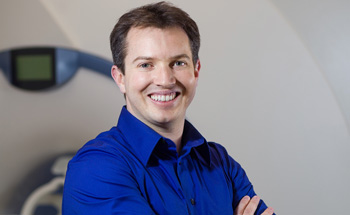
Glenn Fox
The testimonies in USC Shoah Foundation’s Visual History Archive are used all over the world to teach about history, tolerance and human rights. But now, Glenn Fox is using testimony of Holocaust survivors to learn about something else: gratitude.
Fox is a PhD candidate in neuroscience at the University of Southern California, studying in the Social Emotions program at USC Dornsife’s Brain and Creativity Institute (BCI). His interest in gratitude stems from his undergraduate years, when he was interested in psychology and religion. Looking for a more universal way to study religion, Fox landed on the concept of gratitude, since it is an important feature shared by all religions.
“It’s hard to change your first initial reaction to a gift,” Fox said. “That’s what I became really interested in. What is the experience of gratitude when you receive a good gift? What does it take to create gratitude? What happens in the body while you’re experiencing it?”
Fox and his team developed a “gift-space model” that looks at gratitude as a product of the perceived effort it takes to create a gift and the amount of need a person has for a gift. The model allows Fox to study a continuum of gratitude – from the awkward gratitude a vegetarian might feel if a friend cooked her an all-meat barbeque, for example, to the intense gratitude a starving person might feel for a stranger who puts herself in harm’s way to procure food for him.
The goal of Fox’s research is to measure how changes in gratitude occur at small gradations over a range of gift-giving scenarios. In order to conduct studies that measure these changes, he needed, of course, a range of gift-giving scenarios. Fox found these scenarios in the testimonies of Holocaust survivors in USC Shoah Foundation’s Visual History Archive.
Fox and his team of undergraduate researchers spent the summer of 2010 watching testimony and collecting stories the survivors told in their testimonies about situations in which they received a positive gift, such as starving survivors receiving non-Kosher food, or warm boots when they had no shoes, or an immigration official allowing them to leave the country. The stories were distilled into 30-word statements written in the first person.
In Fox’s first study, participants were asked to read each statement, taking the perspective of the survivor, and think about how they (the participant) would feel in that situation. They then rated the effort it took to give the gift, how much they needed the gift, and their gratitude for the gift on a continuous scale. In the second study, the participants’ heart rates were measured as they read and rated the statements, and in the third study, their brain activity was measured.
The results so far, Fox said, are surprising and fascinating. The research supports his hypothesis that effort and need correlate with gratitude – that even gifts that aren’t quite as needed but require great effort by the giver elicit strong feelings of gratitude – but it also demonstrates that the amount of need for a gift correlated more strongly with high ratings of gratitude than the effort exerted by the gift-giver.
“That’s counter to some previous results that show that ‘it’s the thought that counts,’” Fox said. “While that is true, in our case, if you’re in a wintertime death march and your shoes are worn out and you get a new pair of boots, it doesn’t really matter where it comes from or the thought behind it. If it keeps your feet dry, if it saves your life, you’re going to be grateful for it.”
In addition, Fox said he was surprised to see that the heart rates from low- and high-gratitude gifts followed completely distinct, non-overlapping patterns. Higher gratitude, it seems, spurs feelings of relief, which lowers the heart rate. The results point to the possible health benefits of gratitude, Fox said.
The brain imaging demonstrated that specific areas of the brain are activated when people experience gratitude – even though gratitude is such a complex, wide-ranging emotion.
“To know better what regions [in the brain might be responsible for gratitude] is a really great first step toward understanding how we can advance and promote gratitude in the world,” Fox said.
Working with the USC Shoah Foundation and learning about the Holocaust has completely changed how he thinks about trauma and suffering, Fox said. The fact that survivors still express strong feelings of gratitude for the people who saved their lives, and that those who had very little themselves and nothing to gain by helping them still managed to do so – demonstrates what could be possible in everyday life.
“If you could generate gratitude and have pro-social emotions during something as difficult as the Holocaust, what does that say?” Fox said. “We can do better to create more gratitude.”